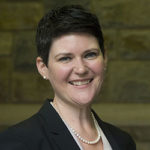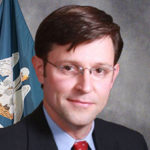The head of a Baptist religious liberty watchdog group warned in a Religion News Service op-ed Feb. 9 that removing limits on political activity by tax-exempt charities could harm churches more than help them.
Amanda Tyler, executive director of the Baptist Joint Committee for Religious Liberty, said President Trump’s pledge to “get rid of and totally destroy” rules that 501(c)(3) organizations must follow in order to receive and retain tax-exempt status isn’t about protecting free speech.
In a counterpoint to an article by Family Research Council head Tony Perkins urging repeal of the so-called Johnson Amendment, Tyler said nothing in IRS regulations prevents churches from engaging moral and ethical issues or pastors from supporting candidates in their individual capacity.
Tyler said churches that want “to wade into the political morass” enough to surrender their 501(c)(3) status risk losing more than a tax break.
“As soon as the church joins at the hip with a particular candidate or party, its prophetic witness — its ability to speak truth to power and not risk being co-opted by the government — is hindered,” said Tyler, a former congressional aide who took over leadership of the organization serving 15 Baptist bodies in the United States Jan. 1. “The credibility and integrity of congregations would suffer with bad decisions of candidates they endorsed.”
In his article, Perkins, who currently serves as interim pastor of a Southern Baptist church in Louisiana, endorsed the Free Speech Fairness Act, introduced last year in the House of Representatives by Majority Whip Steve Scalise (R-La.).
“Pastors will decide differently how and if they will engage on political issues,” Perkins argued. “That is not the point of this legislation. The point is to ensure that those who wish to engage in such speech are free to do so. They would be under the Free Speech Fairness Act.”
Tyler, a former BJC intern and staff member named last September to succeed retiring Executive Director Brent Walker, said there has been no outcry from the grass roots for a change in the law. In fact, she said, surveys show large majorities of Americans don’t want their churches taking sides in political elections.
“Inviting churches to intervene in campaigns with tax-deductible offerings would fundamentally change our houses of worship,” she warned. “There is no incentive for a pastor to alienate any of her parishioners with candidate endorsements. For people in the pews, their reasons for going to church most likely do not include the need to hear another political campaign ad.”
While churches are not immune to “self-sorting” over political views, Tyler said turning houses of worship into “arms of a political party,” like a figurative “First Democratic Baptist Church” or a “First Republican Baptist Church,” will benefit neither churches nor civil discourse.
Southern Baptist Congressman Mike Johnson (R-LA) signed on Feb. 2 as a co-sponsor of legislation that would permit charities to make political statements “in the ordinary course” of carrying out their tax-exempt purpose, as long as they do not incur “more than de minimis incremental expenses” in doing so.
“There is a generation of clergy in this country who do feel that they’ve been censored and silenced,” Johnson, a member of First Baptist Church in Bossier City, La., said at a Capitol Hill press conference reintroducing the Free Speech Fairness Act in the House and Senate.
“They feel like they can’t get into their own pulpits on Sunday morning and speak to the important moral and social issues of the day — to speak to, heaven forbid, a political issue — because they are afraid their tax-exempt status may be in jeopardy,” said the first-term congressman who previously worked as a lawyer for the Alliance Defending Freedom.
The Alliance Defending Freedom, a conservative activist group, each year promotes “Pulpit Freedom Sunday,” encouraging pastors across the country to preach a political sermon in civil disobedience to the IRS ban on church politicking.
“For all those years it has been on the books, we think it’s been ripe to be struck down by the courts,” said Johnson of the electioneering ban. “There’s just never been any opportunity to challenge it legally.”
He said the proposed legislation would “unleash the voice of people of faith, and that’s what this country was founded upon.”
“Generations before all this, before the Johnson Amendment became part of our Internal Revenue Code, persons of faith, clergy, felt free in the pulpit to speak their mind,” Johnson said. “That’s part of the fabric of who we are as Americans, and we’ve got to return to that principle. It’s what the founders of this country believed in, and we want shepherds to be able to speak freely to their flock.”
Tyler said allowing charitable organizations to spend money on political campaigns would open the door to IRS scrutiny into the inner workings of churches in order “to determine whether the speech is in line with a group’s purpose and to examine financial accounts to calculate a percentage of funds spent on politics.”
Tyler said the role of ministers in the civil rights movement demonstrates that it’s possible for churches to be agents of change without turning into a political action committee.
“Politicizing churches is not a solution to a problem,” she said. “It is a problem in search of a problem. Churches are not political committees, nor should they be.”
The Southern Baptist Convention, a founding member of the Baptist Joint Committee, withdrew from the coalition in 1991, over differences with Walker’s predecessor James Dunn, and opened an office in Washington for lobbying by the SBC Ethics and Religious Liberty Commission.
The two organizations have worked together on some issues, including the right of Muslims to build a mosque in New Jersey, and taken opposite paths on others, such as a dispute involving a Missouri church denied participation in a state solid-waste program that recycles used tires to create safe surfaces on children’s playgrounds awaiting oral arguments before the U.S. Supreme Court.
After Southern Baptists pulled out, the BJC added a new individual membership category called the Religious Liberty Council, which holds its annual gathering in conjunction with the General Assembly of the Cooperative Baptist Fellowship.


